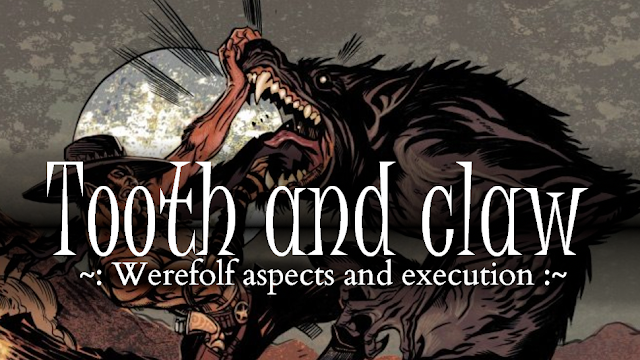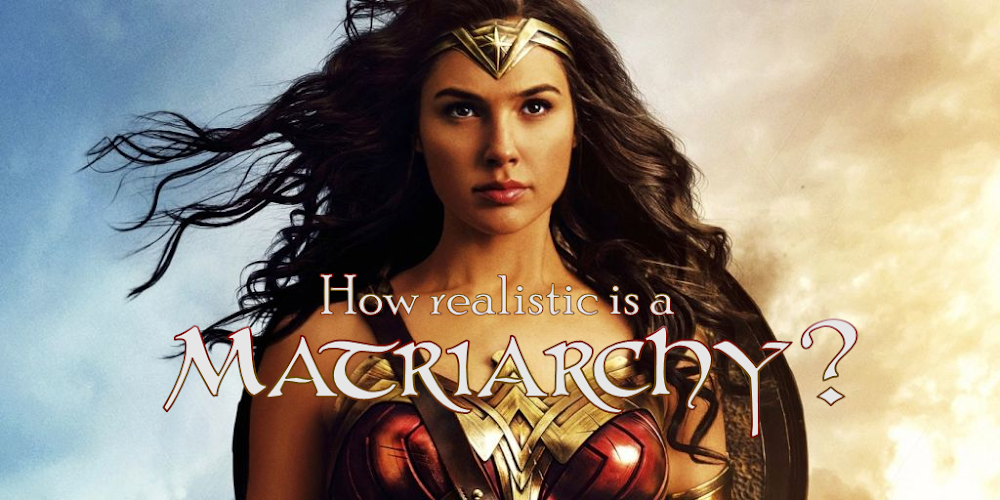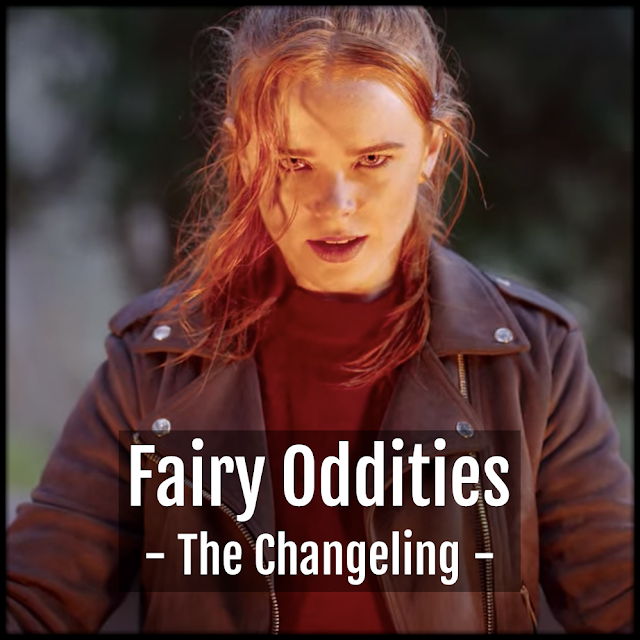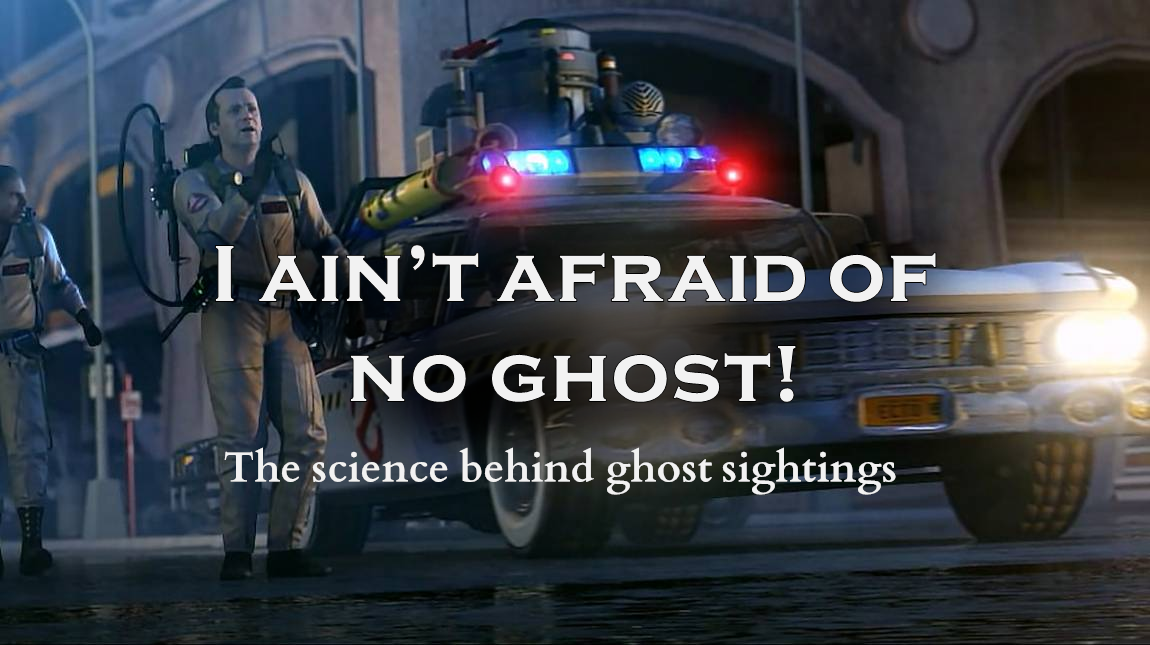Tooth and claw - Aspects and execution of werewolves
Hey there,
travelers!
1. The savagery
Okay, I
think we can all agree wolves are scary as shit. The earliest appearances in
fiction were almost entirely horror stories and the iconic werewolf adversary
in any spooky medium still gives us the creeps. In my understanding, this is
because their savage and predatory nature. They have an instinct to hunt, to
claim territory and devour anything that sets foot inside. Although modern zoology
tends to show these noble beasts in a much friendlier light, older horror
fiction kept to the juicy bits. They were portrayed as soulless beasts with no
regrets, no thought and no emotions, only an unquenchable thirst for blood. You
can spot these werewolves nowadays in titles such as The Witcher, Skyrim, Harry
Potter or a number of indie horror novels and I love it.
The whole
concept of an uncontrollable monster living under the skin of a regular old
human being is really fascinating. There are several ways the character’s human
side can relate to their occasional disemboweling of innocent creatures. If
they shun it, like for example Remus Lupin in the Harry Potter series, it
breeds conflict within the character itself, giving way to a whole armada of
possible reactions. A werewolf can be suicidal, introverted, melancholic
because of the heavy burden—or the exact opposite. Sometimes loosing control
and thus being unaccountable for ones deeds means freedom, a refreshing escape
from mundanity and that could behave like the most severe drugs (like in the
case of Aela from Skyrim’s Companions’ Guild).
2. The power
Oh, yes,
muscles larger than a greek god and claws shredding titanium, who wouldn’t want
that feeling of invincibility? In some cases, the characters stricken with
lycanthropy (especially when they’re largely in control of it) view it as a
tool, a power one should utilize to achieve their ends. If you think about the
Underworld movies, the second generation of lycans used their powers to defend against
the vampires’ crusade and free themselves from servitude. My favourite
installation of this trope is the case of Vincent Meis, a minor character in
The Witcher 1 Chapter III. This guard captain in Vizima is a lycanthrope who
acts as a kind of vigilante superhero. When it’s time for his transformation,
he uses the feral beast’s agility and tracking skills to hunt down the city’s
most wanted criminals, saving the lives of ordinary folk.
If you ask
me how could one further this aspect, I’d say account for weaknesses as well.
As with every power, it can make a character overly confident or even bold, and
when a stray silver bullet comes their way and shatters their ego, it can
really hurt. And hurt means character development, something every author tries
to integrate into their stories. Let your werewolves run wild and shred people
to pieces, then shoot them chock full with silver and see them grow as a person
~
3. The pack
Sailing
onto more recent topics, we all now there’s no such thing as a lone wolf. No
matter how much Geralt insinst on being one, wolves are pack animals, and so
are werewolves—in some cases. You needn’t look further than Twilight to figure
out the appeal of a pack, a gathering of like-minded people who will fight and
die for each other. If you’re unsure why a society is important, we’ve already talked
about it here, but to sum it up: from the times for our ancestors, being alone
meant being destined to die, so our human psyche favors groups to lonesomeness.
Werewolf packs are like the Lamborghini of groups, because they have more
common traits then any other. First, they all experienced something nobody else
has (turning into a wolf or wolf-man). Second, since most titles still
establishes lycanthropy as socially unacceptable, they have a common secret.
Something they should keep among themselves, something they can refer to and
that differentiates them from common folk, pushing them even closer together.
The third, and here’s the kicker—they can’t choose else. Many of these stories
include that werewolves have a pack instinct, an inner calling that makes them crave
each other’s company and thus they know they’ll stick together no matter what.
This last aspect is ripe for abuse and I’ve read (reviews of) horrible paranormal
romances that did just that. Please, for the love of Romulus, don’t use this
instinctual belonging as a reason to keep a verbally, mentally and physically
abused character coming back to the pact, because that’s not relatable, that’s
just sad.
4. (Now we’re getting weird) The mates
Okay, now
we arrive at Imprinting and similar things. The idea of having a pre-destined,
fated mate is an exciting topic (at first): the alpha werewolf having an omega
nobody as his fated mate, the one he HAS to choose no matter what. This simple
position breeds (no pun intended) conflict, and that is the driving force of
stories. BUT! You can so easily mock this up. Nowadays market is flooded with
these alpha werewolf stories, partially because of the alpha’s character
(another throwback about why that’s alluring is around here), partially because
the fated mates trope. How can this be bad? Like with so many other tropes, by
sticking to the tried and tired formula and not changing a thing. The best in
show prize of a male falling in love with a grey, insignificant nobody snuck
its way through every possible genre, from YA school romances, crime stories,
historical fiction, and now paranormal romances. Mix it up! You can’t really
change the alpha (although you can play with genders a bit), but the mate doesn’t
have to be nearly incompetent. What if he/she is a total badass, just not in a
way that befits an alpha’s mate? What if they are already taken and the conflict
tears apart the pack? What if it’s not love that bonds them but an everlasting
rivalry? This could be a really good enemies to lovers trope if executed well.
I’ll be
honest, I’m not one for paranormal romances, so take everything I say with a
grain of salt. At the end of the day, there is no correct way of writing a
story, these are just the two cents of a story junkie. Howl away, friend! May
Hircine take you.
Dar








Comments
Post a Comment